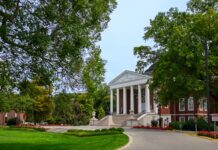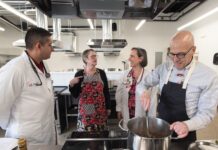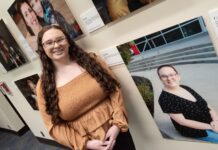
The University of Louisville’s Christina Lee Brown Envirome Institute has received a pledge of $1 million from the Trager family to establish the Trager Micro-Forest Project, a scientific inquiry into the impact of intense urban greening on human health, economic vitality and the natural environment.
The Envirome Institute has secured a 30-year lease with Louisville Metro Government to use Founders Square as an outdoor laboratory to research innovative ideas in urban greening. Patrick Piuma, director of the Envirome Institute’s Urban Design Studio, will oversee a project to intensely plant Founders Square with native plant and tree species while creating an accessible, inviting and functional public space for anyone to enjoy. The project at Founders Square will build on the Envirome Institute’s groundbreaking work with the Green Heart Project, which is examining the scientific link between nature and human health.
“The Trager Micro-Forest Project is a transformative project connecting people with nature, starting in the heart of our city,” said Michael Trager-Kusman. “The members of our family are honored to support learning about the impact of scientifically planned and planted green spaces in the city we love.”
The project will provide an opportunity for UofL researchers in multiple disciplines to work with members of the community and other organizations to track and measure changes in human health and well-being and to study the project’s impact of biodiversity, micro-climates, economic development and public safety. The learning from this project can be used to inform the way city planners integrate nature into urban environments everywhere.
“This is an exceptional project for UofL’s Envirome Institute at the New Vision of Health Campus, and we are delighted to have the Trager family’s generous support as we embark on new fields of inquiry into the impact of the built environment on human health,” said Lori Stewart Gonzalez, interim president of UofL.
“The Envirome Institute is committed to the health and vitality of downtown Louisville, which is why we’re establishing our New Vision of Health Campus downtown at Fifth Street and Muhammad Ali Boulevard,” said Aruni Bhatnagar, director of the Christina Lee Brown Envirome Institute. “The Trager Micro-Forest Project is not simply a beautification project. It is a scientific project, which will be the first of its kind in our region of the country.”
“The Trager Micro-Forest Project and the Envirome Institute’s New Vision of Health campus are catalysts for positive momentum during this pivotal time for downtown Louisville. These initiatives complement our commitment to a sustainable future, a commitment that requires vision and action. We expect these initiatives will spur additional economic development in the area while adding well-planned and maintained green spaces that make our downtown area more attractive for those who live, work and visit there. Thank you to the Trager family for their support of the Envirome Institute’s innovative and forward-thinking project,” said Mayor Greg Fischer.
In the past, Louisville’s downtown was a vibrant hub of activity, from shopping and industry to entertainment and culture. The Trager Micro-Forest Project is intended to excite and engage the community while changing perceptions of downtown and promoting a greener and healthier city.
Initial work on the Trager Micro-Forest Project is already underway. Researchers are analyzing current park usage and taking air and surface temperature measurements in Founders Square and surrounding properties, and they have completed an inventory of the existing trees. This past summer, they used ground-penetrating radar to peer beneath the surface of Founders Square to identify any possible underground obstacles. Community members will be invited to participate in activities on site and provide input into the project over the next few months, with plantings to follow.































